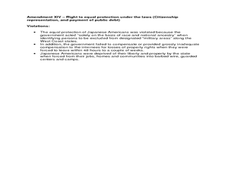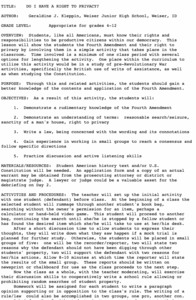Curated OER
The Bill of Rights And Japanese Internment
Learners review the Bill of Rights. They interpret how the American Government violated these rights with regard to Japanese Americans during World War II. They write down the violations of the Bill of Rights during Japanese ...
Curated OER
Freedom of Expression in Special Places
Young scholars analyze the judicial decision making process, and identify three places presenting First Amendment problems. They analyze how the 1st Amendment applies to school newspapers, and argue for and against limiting 1st Amendment...
Curated OER
Forced Assimilation
Students identify ways that a society promotes assimilation and examine areas where it still occurs in our present culture. They assess the value of assimilation.
Curated OER
Letters, Telegrams, and Photographs Illustrating
Students research the factors that are important in winning a battle in the Civil War. In a second activity they are assigned the role of a specific type of person during the Civil War and asked to describe what it's like being that person.
Curated OER
Local Governments Don't Do Much ... Or Do They?
Students study and explore their local government. They role play members of their City Council and various constituents as they discuss a variety of subjects typical of a city council meeting.
Curated OER
WHO'S IN CHARGE?
Third graders explore the three branches of government, their origins and the purposes of government. Each team develop a PowerPoint presentation of their findings. Stjudents also explore how to be a good citizen.
Curated OER
Know Your (copy)Rights
Pupils define public domain and provide examples of work in the public domain. They define copyright, provide examples of copyrighted materials, and state the procedure for securing copyright for their own work
Curated OER
Nothing to Fear but Fear Itself
Students investigate the years during World War II in which Japanese Americans living on the West Coast were held in internment camps.
Curated OER
The Holocaust's Legacy
High schoolers investigate contemporary hate groups and then participate in a debate on tolerating their existence of the Holocaust. They work in groups to conduct research. Students use print and Web resources to identify one or more...
Curated OER
The Executive Branch
Students study the federal government, which is divided into 3 branches. They have a minimal understanding of the responsibilities of each branch.
Curated OER
Mueller v. Allen
Students investigate a First Amendment legal case involving religion, education, and reimbursement of tuition payments. They research the background of the cases and its precedents.
Curated OER
Cartogram of the Great Compromise
Students create cartograms of populations during 1790.
Curated OER
Does My Vote Count? Teaching the Electoral College
Students comprehend the purpose, function, origin, and historical development of the electoral college. They evaluate issues of fairness and representation in the electoral process, both individually and through group discussion....
Curated OER
Do I Have a Right To Privacy?
Students, in groups, explore the Fourth Amendment and their right to privacy. They explore reasonable search/seizure, sanctity of a man's house, right to privacy.
Constitutional Rights Foundation
Refugees from the Caribbean: Cuban and Haitian “Boat People”
Should refugees fleeing poverty be allowed the same entrance into the United States as those fleeing persecution? High schoolers read about US foreign policy in the late 20th century regarding refugees from Cuba and Haiti, and engage in...
Constitutional Rights Foundation
History of Immigration Through the 1850s
Everyone living in the United States today is a descendant from an immigrant—even Native Americans. Learn about the tumultuous history of American immigration with a reading passage that discusses the ancient migration over the Bering...
Federal Reserve Bank
GDP: Does It Measure Up?
Here is resource that offers a very clear explanation for how economists measure economic growth by comparing real GDP over time. There is also an additional worksheet that details the expenditure method and four components for...
Curated OER
Comparative Government: Japan & the United States
Learners compare the governmental systems of Japan and the United States. As a class, they discuss the differences between the parliamentary system and the presidential system. Pupils read provided handouts about the duties of a a...
Curated OER
Documents of Natural Rights: The Declaration of Independence and The Plan of Delano
Eighth graders analyze the philosophy of government in the Declaration of Independence. As a class, they discuss how this philosophy has caused other revolutions in history and how well it supports our natural rights. In groups, they...
Curated OER
Expressive Linear Sculpture
Learners develop skill in utilizing line in a 3 dimensional context. They explore a variety of techniques for mounting sculptures to a base.
Curated OER
Abraham Lincoln
For this Abraham Lincoln worksheet, students read the passage about Abraham Lincoln and answer short answer questions about him. Students complete 4 questions total.
Curated OER
How the Supreme Court Affects the Lives of Teens
Students describe the structure and function of the United States Supreme Court. They examine and analyze decisions made by the Court. They participate in a debate about recent issues.
Curated OER
50th Anniversary of Brown v. Board of Education
Students examine a poster of Brown v. Board of Education and discuss what the important details are. They read the story behind the poster and court case. They role play different sections of the case such as the court case or Linda...
Curated OER
Rome: Republic to Empire
Sixth graders discuss the rise of Rome from a republic to a dictatorship. In small groups, they role-play as congress people debating whether or not to give the president more powers. In another activity, 6th graders produce television...

























